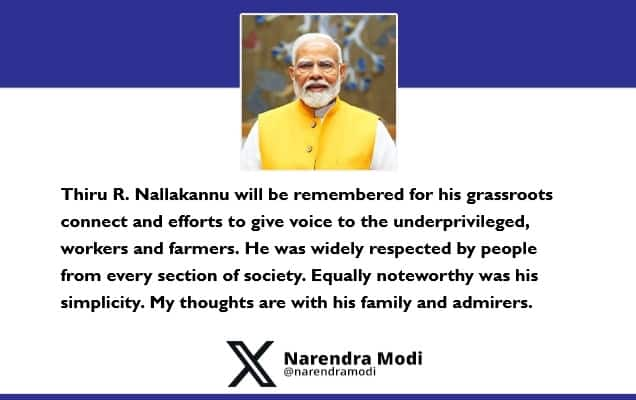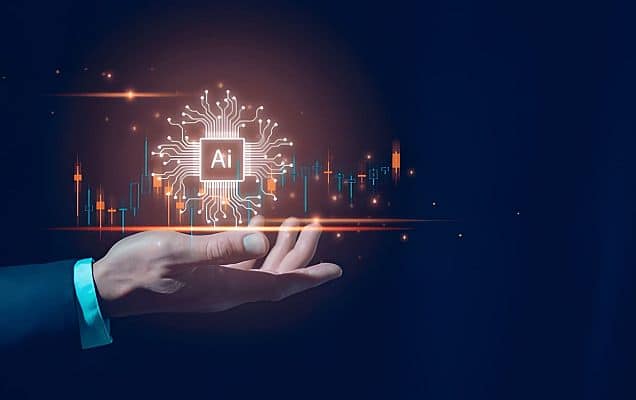Minister of Agriculture and Farmers' Welfare, Shri Shivraj Singh Chouhan, President of the International Conference of Agricultural Economics, Dr. Matin Qaim, Member of NITI Aayog, Shri Ramesh ji, agriculture scientists from Bharat and other countries, our colleagues from various universities involved in research, experts and stakeholders associated with the agriculture sector, ladies and gentlemen,
I am happy that the ICAE conference is being held again in Bharat after 65 years. You have come to Bharat from different countries around the world. I welcome you on behalf of Bharat’s 120 million farmers. I welcome you on behalf of Bharat’s over 30 million women farmers. I welcome you on behalf of the country's 30 million fishermen. I welcome you on behalf of the country's over 80 million livestock keepers. You are in a country with 550 million animals. I welcome you to Bharat, the agricultural and animal-loving country.

Friends,
Bharat is as ancient as our beliefs and experiences regarding agriculture and food. And science and logic have been given priority in Indian agricultural tradition. Today, there is so much concern around the world regarding food and nutrition. But thousands of years ago, it was said in our scriptures - अन्नं हि भूतानां ज्येष्ठम्, तस्मात् सर्वौषधं उच्यते।। This means, among all substances, food is the best, and hence, food is considered the root of all medicines. We have a whole Ayurvedic science of using our food with medicinal properties. This traditional knowledge system is a part of the social life of Bharat.
Friends,
This is ancient Indian wisdom regarding life and food, and agriculture in Bharat has developed based on this wisdom. About 2,000 years ago, a scripture named ‘Krishi Parashara’ was written in Bharat, which is a heritage of all human history. It is a comprehensive document on scientific farming, and its translated version is also available. This scripture elaborates on various topics such as the influence of celestial bodies on agriculture, types of clouds, methods of measuring and forecasting rainfall, rainwater harvesting, organic manure, livestock care, seed protection, and storage. Continuing this legacy, a strong ecosystem of education and research related to agriculture has been established in Bharat. The Indian Council of Agricultural Research alone has over a hundred research institutions. There are more than 500 colleges in Bharat for studying agriculture and related subjects. Bharat has over 700 Krishi Vigyan Kendras (agricultural science centres) that help deliver new technology to farmers.
Friends,
Another specialty of Indian agriculture is that we still plan everything considering the six seasons. Our country has its unique characteristics within fifteen agro-climatic zones. Farming changes if you travel a few hundred kilometres in Bharat. Farming in the plains is different, farming in the Himalayas is different, farming in the deserts is different, farming in areas with less water is different, and farming in the coastal belt is different. This diversity makes Bharat a beacon of hope for global food security.

Friends
The last time the ICAE conference was held here, Bharat had just gained independence. It was a challenging time for Bharat’s food security and agriculture. Today, Bharat is a food surplus country. Today, Bharat is the largest producer of milk, pulses, and spices. Bharat is the second-largest producer of food grains, fruits, vegetables, cotton, sugar, tea, and farmed fish. There was a time when Bharat’s food security was a matter of global concern. Now is the time when Bharat is engaged in providing solutions for global food security and global nutrition security. Therefore, Bharat’s experiences are invaluable for discussing topics like 'food system transformation.' This will especially benefit the Global South.
Friends,
Bharat prioritizes the welfare of humanity as a ‘Vishwa Bandhu’ (global friend). Bharat presented the vision of 'One Earth, One Family, and One Future' during the G-20. Bharat also gave the mantra of 'Mission LiFE,' which emphasizes an environmentally-friendly lifestyle. Bharat started the 'One Earth-One Health’ Initiative as well. We cannot view human, animal, and plant health separately. Whatever challenges being faced by sustainable agriculture and food systems today can only be tackled with a holistic approach of 'One Earth, One Family, and One Future.'
Friends,
Agriculture is at the centre of our economic policy. About ninety per cent of families in our country have very little land. These small farmers are the biggest strength of Bharat’s food security. The same situation exists in many developing countries in Asia. Therefore, Bharat’s model can be beneficial for many countries. For example, sustainable farming is one area where we are promoting large-scale chemical-free natural farming in Bharat, and we have seen very positive results. This year’s Budget also places a significant focus on sustainable farming and climate-resilient farming. We are developing an entire ecosystem to support our farmers. Bharat emphasizes research and development related to climate-resilient crops. In the last ten years, we have provided nearly 1900 new climate-resilient varieties to our farmers. This benefits Indian farmers. There are some varieties of rice in our country which require 25 per cent less water compared to traditional varieties. In recent years, black rice has emerged as a superfood in our country. The black rice of Manipur, Assam, and Meghalaya is appreciated for its medicinal value. Bharat is equally eager to share these experiences with the global community.

Friends,
Water scarcity, climate change, and nutrition are significant challenges in today’s time. Bharat has solutions for these challenges. Bharat is the world’s largest producer of millets, which the world calls superfood, and we have identified it as 'Shree Anna.' It works on the principle of minimum water, maximum production. Bharat’s various superfoods can play a significant role in addressing the global nutrition problem. Bharat wants to share this basket of superfoods with the world. Additionally, the entire world celebrated the International Year of Millets at Bharat’s initiative last year.
Friends,
In the past decade, we have made numerous efforts to connect farming with modern technology. Today, a farmer can use soil health cards to know what to grow. They can run pumps with solar power and earn from solar farming on wasteland. They can sell their produce through e-NAM, the digital agriculture market of Bharat. They use the Kisan Credit Card and ensure the security of their crops through the Pradhan Mantri Fasal Bima Yojana (Prime Minister’s Crop Insurance Scheme). From farmers to agritech start-ups, from natural farming to farm stays and farm-to-table arrangements, agriculture and related sectors in Bharat are continually being formalized. In the last ten years, we have connected 90 lakh hectares of farmland to micro-irrigation. Our ethanol blending program is benefiting both agriculture and the environment. We are rapidly moving towards the target of 20 per cent ethanol blending in petrol.

Friends,
We are extensively using digital technology in the agriculture sector in Bharat. Through the PM-Kisan Samman Nidhi, money is transferred to the bank accounts of 10 crore farmers in just 30 seconds with a click. We are building digital public infrastructure for digital crop surveys. This will help our farmers receive real-time information who can then make data-driven decisions. This initiative will benefit crores of farmers and improve their economic status. The government is also running a major campaign to digitize land records. Farmers will be given a digital identification number for their land. We are rapidly promoting the use of drones in agriculture. Women, our ‘Drone Didis,’ are being given command of farming done with drones. All these steps will benefit Indian farmers and strengthen global food security.
Friends,
You will all have detailed discussions here in the next five days. I am particularly delighted to see the large participation of women and youth. Everyone will be keenly watching your ideas. I hope that this conference will help us find ways to connect the world with sustainable agri-food systems. We will learn from each other and teach each other.

Friends,
Since you are associated with the agricultural world, I feel compelled to share one more piece of information with you. I am not aware of any farmer's statue anywhere in the world. We have heard about the Statue of Liberty as the tallest statue in the world. But all my colleagues in the agricultural world will be pleased to know that the world’s tallest statue is of Sardar Vallabhbhai Patel in Bharat, who awakened the strength of farmers and connected them with the mainstream of the freedom movement of Bharat. It is twice the height of the Statue of Liberty and is of a farmer leader. Another special feature is that when this statue was made, farmers from six lakh villages in Bharat were asked to give a piece of the iron tool they used in their fields. Iron tools used in fields from six lakh villages were brought, melted, and the iron was used in the statue of the world’s tallest farmer leader. I truly believe that the great honour given to this son of a farmer in this country has perhaps not happened anywhere else in the world. I am confident that since you are here, you will be attracted to see the Statue of Unity, the world’s tallest statue. Once again, I extend my best wishes to all of you!
Thank you!













